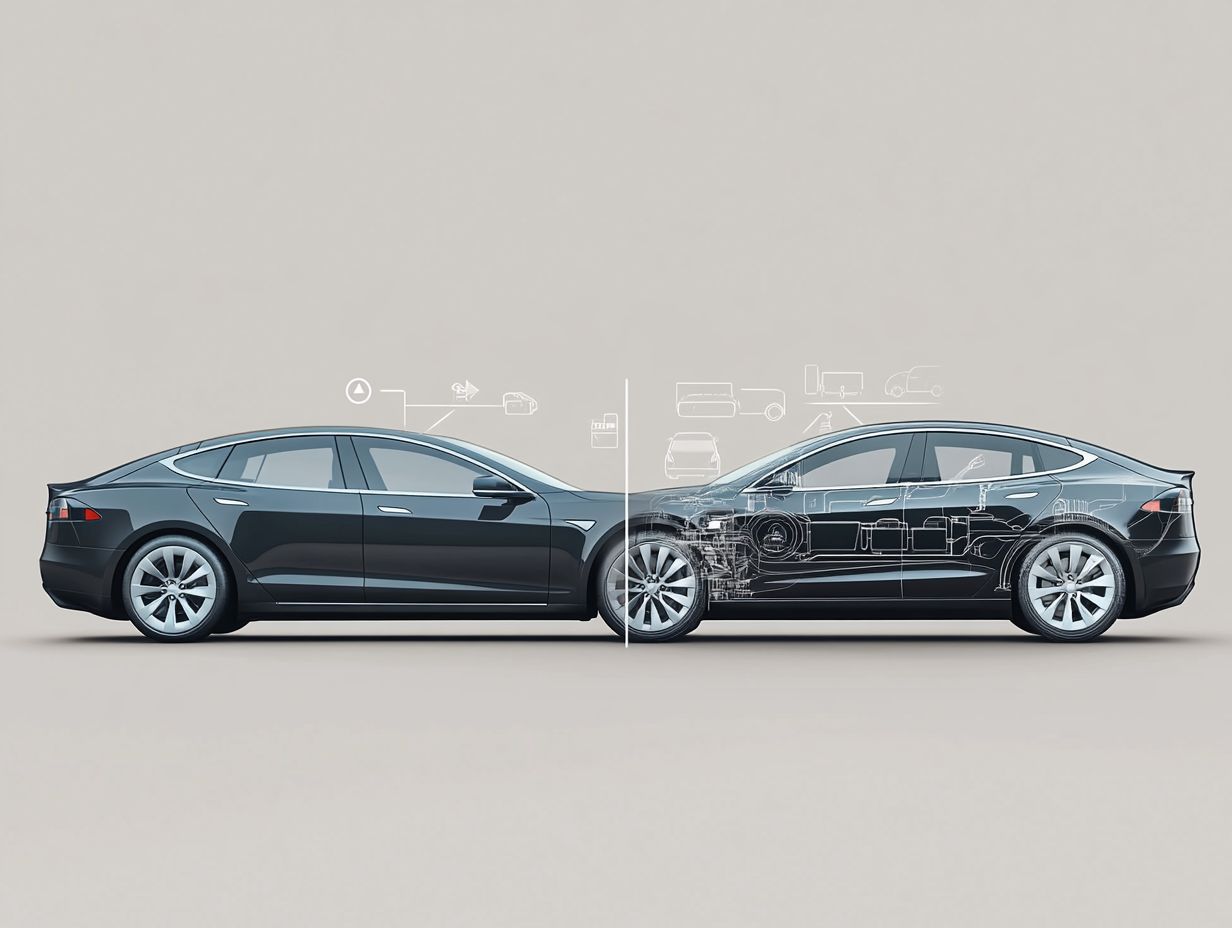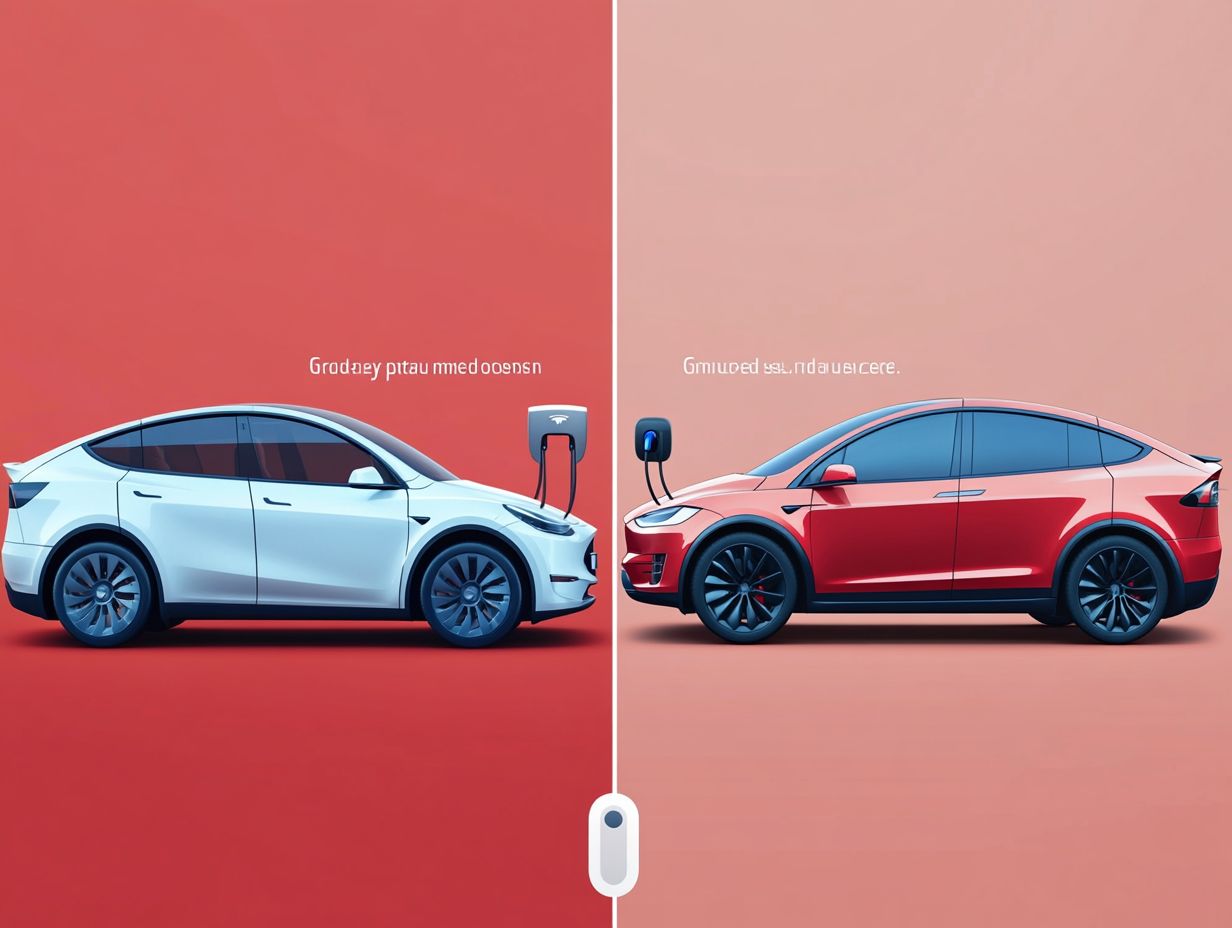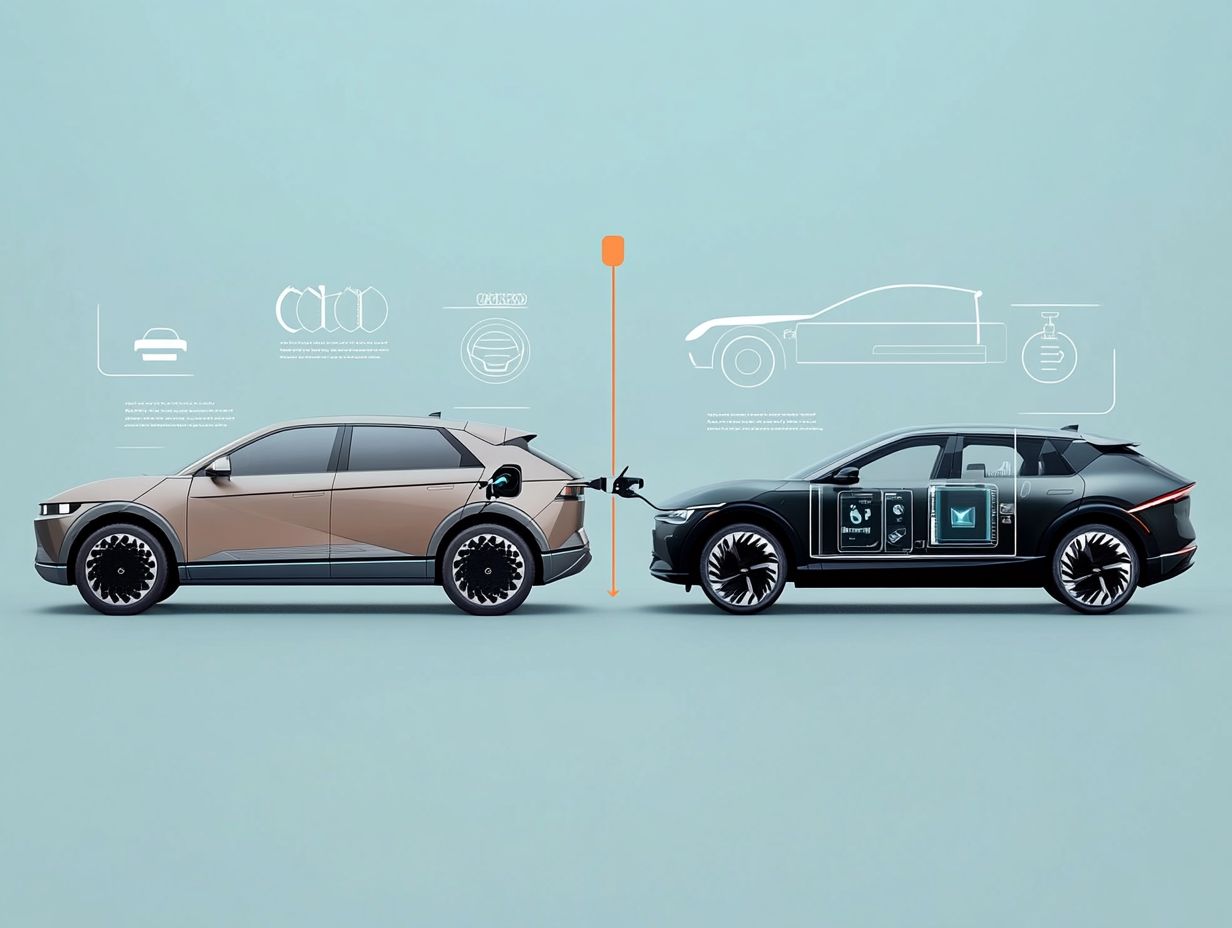Feature Analysis: Gas vs. Electric Vehicle Features
As the car market continues to evolve, the debate between gas and electric vehicles (EVs) becomes ever more compelling. Each power source carries its own set of advantages and drawbacks, influencing aspects like performance and environmental sustainability.
This discussion delves into the defining characteristics of gas vehicles, encompassing engine performance and cost considerations, while also exploring the innovative features of electric vehicles, including battery life and efficiency.
By comparing these two options, this information empowers you to make a well-informed decision for your next vehicle.
Contents
- Key Takeaways:
- Features of Gas Vehicles
- Features of Electric Vehicles
- Comparing Gas and Electric Vehicle Features
- Frequently Asked Questions
- What are the main differences between gas and electric vehicles?
- Which type of vehicle is more environmentally friendly?
- What are the maintenance requirements for gas and electric vehicles?
- How do the driving ranges of gas and electric vehicles compare?
- What features should I consider when comparing gas and electric vehicles?
- Which type of vehicle is more cost-effective?
Key Takeaways:

Power Sources Explained
The differences in power sources between electric vehicles and gas cars have a significant impact on both environmental sustainability and your preferences as a consumer. Electric vehicles (EVs) primarily utilize modern batteries, offering a cleaner energy consumption model compared to gas cars, which rely on the traditional engine found in most cars. This shift not only influences vehicle performance but also shapes the broader EV market, driving the development of places where you can recharge your car and advancements in energy efficiency.
If you re shopping for a car today, you re probably noticing these differences, leading to a noticeable shift toward more sustainable options.
Historically, the traditional engine found in most cars has been the backbone of automotive power; however, it contributes significantly to air pollution and greenhouse gas emissions. In contrast, electric vehicles pave the way for reducing your environmental footprint, especially as battery technology evolves, delivering longer driving ranges and quicker charging solutions.
Efficiency ratings further underline this contrast, with EVs typically outperforming gas cars in energy usage. This rising trend among consumers like you reflects a growing desire for vehicles that not only meet performance expectations but also align with a commitment to sustainability. The demand for charging stations is rising, both in urban centers and rural areas, creating a roadmap for future mobility that resonates with your values.
Environmental Impact
The environmental impact of electric vehicles compared to gas cars is an essential consideration for you as a modern car buyer, directly influencing carbon pollution and sustainability. Electric vehicles produce zero tailpipe emissions, significantly reducing air pollution, while gas cars are major contributors to greenhouse gas emissions.
As awareness of climate change increases, consider how your choices impact the planet. Studies show that electric vehicles can cut lifecycle greenhouse gas emissions by up to 70%, particularly when charged from renewable energy sources.
Federal incentives are pivotal in accelerating your adoption of electric vehicles, providing tax credits and rebates that make these cleaner options more accessible. Research indicates that these incentives have led to a notable surge in EV sales, encouraging buyers like you to align their decisions with environmental sustainability.
The pressing need to address air quality issues, combined with the tangible benefits of EV ownership, is reshaping the automotive market into a more eco-friendly landscape.
Features of Gas Vehicles
Gas vehicles are celebrated for their robust engine performance and dependable reliability, attributes that continue to resonate with many consumers, even amid the rising allure of electric vehicles.
With their the traditional engine found in most cars, gas cars often present lower up-front costs, positioning them as an accessible choice for a range of buyers. Yet, this advantage comes with trade-offs; higher maintenance expenses, fuel costs, and potential reliability concerns may emerge as time goes on.
Engine Performance and Maintenance

Engine performance is a hallmark of gas cars, marked by their ability to deliver rapid acceleration and impressive power output qualities that many driving enthusiasts find irresistible. However, this exhilarating performance comes with higher maintenance costs, requiring frequent service checks that can accumulate over time.
Several factors influence this performance, including fuel quality, air intake efficiency, and exhaust systems. All of these factors are vital in determining how effectively an engine operates. The reliability ratings of various models can significantly affect your long-term ownership expenses.
To keep your engine running at its best, regular oil changes, spark plug replacements, and diligent upkeep of cooling systems are essential. Electric vehicles have fewer moving parts. In contrast, gas cars require more maintenance efforts. Neglecting these aspects can lead to hefty repair bills, as aging components may result in decreased efficiency and power loss.
Cost and Availability
The cost and availability of gas cars hold a certain allure for many consumers. They typically have lower average prices compared to electric vehicles, presenting a more accessible option in today’s market. However, it’s important to explore understanding feature sensitivity in electric cars to make an informed decision.
Considerations like fluctuating fuel prices, maintenance expenses, and available financing options are crucial in shaping how you perceive gas car ownership. State and federal incentives for hybrid and plug-in hybrid models can further influence your overall ownership costs.
While some states offer enticing tax credits to encourage electric vehicle adoption, the diverse pricing structures and availability of gas cars present a compelling alternative. For budget-conscious consumers, these vehicles offer reliable transportation without the additional costs often associated with newer technologies.
Features of Electric Vehicles
People love electric vehicles for their exciting features! They stand out with impressive battery life and the convenience of charging, setting them apart from traditional gasoline cars.
Thanks to advancements in battery technology, contemporary EV models provide extended mileage ranges and enhanced efficiency ratings, making them increasingly suitable for daily use.
Additionally, the expanding network of charging stations and the relatively lower costs associated with charging bolster their appeal, making them a compelling choice for many drivers.
Battery Life and Charging
Battery life and charging are essential factors for you as an electric vehicle owner. They directly affect your daily usability and energy consumption patterns. Thanks to advancements in battery technology, today s electric vehicles are engineered for longer-lasting power and quicker charging times, perfectly catering to the habits of modern drivers.
As electric vehicle sales continue to rise, grasping the connection between battery life and the availability of charging infrastructure is becoming increasingly vital for you. The evolution of electric chargers ranging from convenient home units to expansive public fast chargers plays a significant role in easing range anxiety, or the fear of running out of battery power before reaching a charging station.
Recent trends indicate that you, like many consumers, are leaning toward models that offer impressive battery life while ensuring compatibility with an ever-expanding network of chargers. This preference significantly influences your purchasing decisions, enhancing your perception of electric vehicles as convenient and reliable alternatives to traditional cars.
In the end, the seamless integration of battery efficiency and a robust charging infrastructure holds the promise of a more sustainable future for transportation, making your electric vehicle experience all the more rewarding.
Explore your options today and find the perfect vehicle for your needs!
Driving Range and Efficiency

Driving range and efficiency ratings are essential metrics for evaluating electric vehicles. They dictate how far you can travel on a single charge and how effectively the vehicle utilizes energy.
Thanks to improved technology, many electric vehicles now flaunt impressive driving ranges, instilling confidence in your mileage. This helps you estimate potential savings over time.
These advancements are driven by innovations in the way batteries are made and work and how power is used in the vehicle. They have elevated performance standards while alleviating range anxiety.
Manufacturers are focusing on these features to give you more choices. You re increasingly considering not just the driving range but also the overall efficiency ratings when making your purchasing decisions.
This shift is reshaping market dynamics. It’s guiding you toward models that promise lower long-term ownership costs and fewer charging stops, transforming how you view electric vehicles as a viable primary mode of transportation.
Comparing Gas and Electric Vehicle Features
When comparing the features of gas cars and electric vehicles, you’ll uncover significant differences that can shape your purchasing decisions, especially with respect to cost and environmental impact. A detailed feature analysis of gasoline vs. electric engines can provide valuable insights.
While gas cars might seem more affordable at first glance, electric vehicles often lead to greater long-term savings and a diminished carbon footprint. This complexity requires you to weigh both immediate costs and future benefits.
Cost and Convenience
When you evaluate cost and convenience, electric vehicles often stand out as a compelling choice. This is especially true when stacked against gas cars, which tend to have higher maintenance costs over time.
With fewer service checks and lower charging expenses, EVs provide practical benefits that increasingly attract consumers like you. The network of charging stations is expanding, making it easier for those contemplating a switch.
While the initial price tag of electric vehicles may be higher, various incentives and subsidies are making them more budget-friendly. Plus, the cost per mile driven is significantly lower for electric vehicles, thanks to more favorable electricity prices compared to gasoline.
On the other hand, traditional gas cars often demand more frequent oil changes and engine repairs, costs that can accumulate quickly. Therefore, as you make your decision, it s essential to consider not just the upfront expenses but also the long-term savings and convenience that electric vehicles can offer.
Environmental Impact and Sustainability
The environmental impact and sustainability of electric vehicles compared to gas cars is a conversation you can’t overlook as a car buyer. With growing eco-consciousness, electric vehicles significantly reduce carbon pollution.
This heightened awareness reflects a broader trend where environmental health is becoming a priority in everyday decisions. Unlike traditional gas-powered vehicles, which release harmful greenhouse gases and worsen air quality, electric vehicles are engineered to minimize their carbon footprint.
When you charge these vehicles using renewable energy sources, you can further lessen their impact on the planet. Innovations in battery technology are also reducing the need for resource extraction.
As the market evolves, the incorporation of eco-friendly solutions into car design highlights the crucial role your choices play in nurturing a cleaner, healthier environment.
Frequently Asked Questions

What are the main differences between gas and electric vehicles?
The main difference between gas and electric vehicles is the type of fuel they use to power their engines. Gas vehicles use gasoline or diesel fuel, while electric vehicles run on electricity stored in a battery.
Explore electric vehicles today and see the benefits for yourself!
Which type of vehicle is more environmentally friendly?
Electric vehicles are generally considered more environmentally friendly. They produce zero emissions compared to gas vehicles, which emit pollutants that contribute to air pollution and climate change.
What are the maintenance requirements for gas and electric vehicles?
Gas vehicles require regular oil changes and tune-ups. Electric vehicles have fewer moving parts, leading to less maintenance. However, the battery may need replacing after several years.
How do the driving ranges of gas and electric vehicles compare?
Gas vehicles typically have a longer driving range of about 300-400 miles on a full tank. Electric vehicles usually range from 100-300 miles on a full charge. Good news: battery technology is improving, which enhances electric vehicle ranges.
What features should I consider when comparing gas and electric vehicles?
When comparing gas and electric vehicles, consider the cost of fuel versus electricity. Look at charging time, driving range, and availability of charging stations. For a deeper understanding, check out the feature breakdown: hybrid vs. electric vehicles. Also, evaluate performance, handling, and safety features.
Which type of vehicle is more cost-effective?
Electric vehicles can be more cost-effective over time due to savings on fuel and maintenance. Gas vehicles may have a lower upfront cost. Analyze your driving habits to make the smartest choice.






